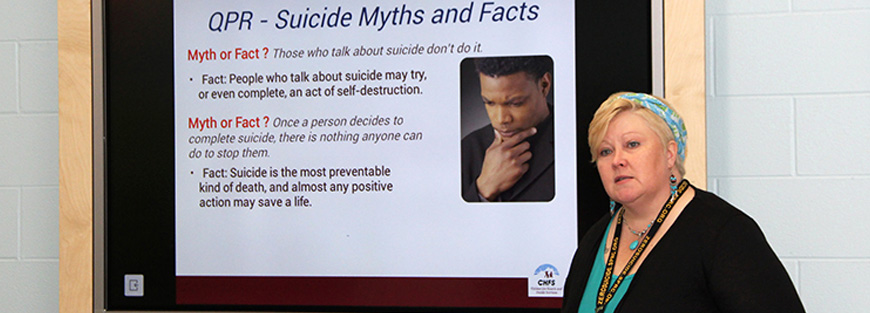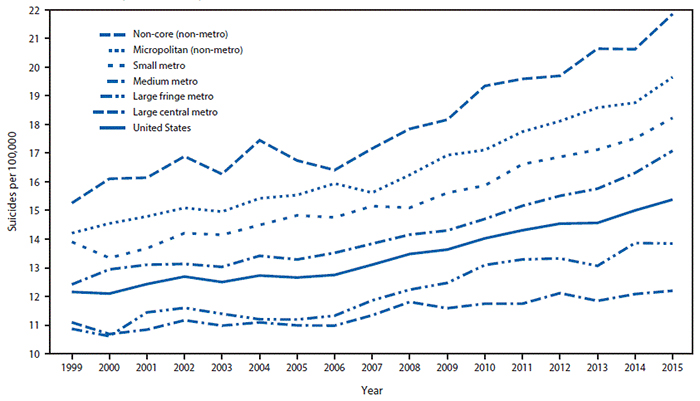
OCT
Ask the Question - and Maybe Save a Life
State Employee Brings Suicide Prevention Techniques to Blue Grass Stockyards
By TED SLOAN, Kentucky Agricultural News
LEXINGTON, Ky. (Oct. 30, 2018) — A friend makes an off-the-cuff remark, or posts a message on social media, suggesting he may be considering ending his life. What do you do?
That question has become increasingly relevant in the agricultural community in recent years as the number of suicides among farmers and agricultural workers has attracted the national spotlight.
Two employees in the Kentucky Cabinet for Health and Family Services might be able to help. Tammy Barrett and Lesa Vanderpool in the Division of Behavioral Health travel across the Commonwealth to teach suicide prevention techniques. Their method is called Question, Persuade, Refer, or QPR.
Barrett brought their message to the new Blue Grass Stockyards facility in Lexington for two sessions in September.
“It’s very rewarding,” Barrett said of her work in suicide prevention. “It’s hard at times. I like to say it’s not hard work, it’s heart work.”
Developed by Dr. Paul Quinnett in the 1990s, QPR is a technique to offer hope to persons who may be contemplating suicide. QPR training is intended to dispel myths about suicide, help training participants see warning signs, and teach them how to prevent someone from taking his or her own life.
The best way to begin that process, Barrett said, is to ask the person directly when you see a sign that he or she is considering suicide. Asking the question can reduce anxiety, open a line of communication, and actually reduce the chances that the individual will act.
Signs can include direct or indirect verbal clues, a drastic change in behavior, or a situation that could lead to a response. That could mean being fired from a job or losing a relationship, but for a farmer, Barrett said, that could mean an accident that reduces mobility or an economic crisis that prevents a farmer for passing the farm down to the next generation.
From there, QPR teaches to persuade the individual to stay alive and help them get treatment.
In 2016, 756 individuals died by suicide in Kentucky – more than three times as many as those who lost their lives by homicide. Barrett believes that figure underestimates the actual number of persons who took their own lives.
Sixty percent of those who die by suicide are not in treatment. Barrett said the social stigma of mental illness and the fear of being incarcerated or institutionalized discourages some people from seeking treatment. She said many people in rural Kentucky lack access to treatment in their communities, especially in the western part of the state.
The Centers for Disease Control and Prevention said the age-adjusted rate of suicides in rural Kentucky was 17.7 per 100,000 population compared with the overall state rate of 16.1 from 1999-2016. Nationally, suicides rates in less urban areas are higher than those in more urban areas, and the gap has widened in recent years, the CDC reported.
The training sessions Barrett and Vanderpool offer fall into two categories. Gatekeeper training is a half-day session for anyone who wants to learn the signs that someone may be contemplating suicide and how to respond using the QPR method. Train the Trainer sessions, which run a full day, teach participants to teach QPR for Gatekeepers. Participants in Train the Trainer sessions may be eligible for continuing education units (CEUs).
Barrett and Vanderpool reach thousands of people in hundreds of training sessions every year, and Barrett said their message is getting across.
“We have people asking for training who never have before,” she said. “That’s a huge success.”
To schedule a QPR training, contact Barrett at tammys.barrett@ky.gov or Vanderpool at lesag.vanderpool@ky.gov.

Source: Centers for Disease Control and Prevention

